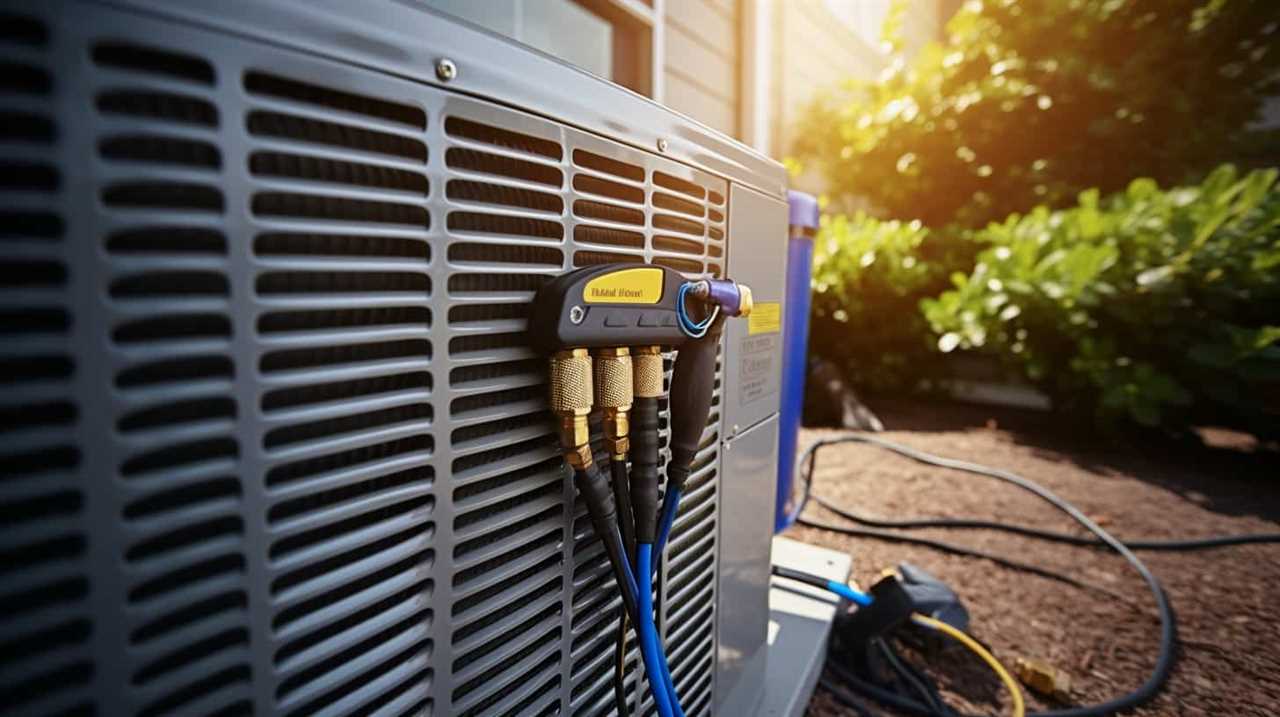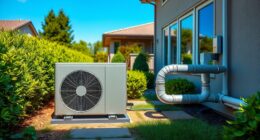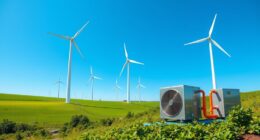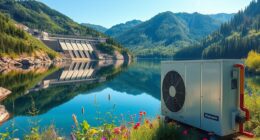We have uncovered a secret to reducing energy costs: heat pump HVAC systems.
Did you know that these innovative systems can reduce energy consumption by up to 50% compared to traditional heating and cooling methods?
In this article, we’ll show you how to master heat pump technology for maximum energy efficiency.
From choosing the right system for your home to maintenance and troubleshooting tips, we’ve got you covered.

Get ready to liberate yourself from high energy costs with our heat pump HVAC systems mastery guide.
Key Takeaways
- Heat pumps are versatile systems that can provide both heating and cooling.
- Heat pump technology offers energy efficiency, improved indoor air quality, and reduced carbon footprint.
- Choosing the right heat pump system involves assessing specific heating and cooling needs, considering factors such as home size and climate conditions, and selecting a reputable brand.
- Maximizing energy savings with heat pump systems can be achieved through smart thermostat settings, regular maintenance, and proper use of programmable thermostats.
Understanding Heat Pump HVAC Systems
We are going to explain the inner workings of heat pump HVAC systems.
When it comes to heat pump installation, understanding the basics of how these systems operate is crucial.
Heat pumps work by transferring heat energy from one place to another, using a refrigeration cycle. They can be used for both heating and cooling purposes, making them versatile and efficient.

During the heating mode, the heat pump extracts heat from the outside air and transfers it indoors. In the cooling mode, it absorbs heat from indoors and releases it outside.
This process is achieved through the use of a compressor, evaporator, condenser, and expansion valve.
Benefits of Heat Pump Technology for Energy Efficiency
To maximize energy efficiency, it is important to understand the benefits of heat pump technology. Heat pumps offer several advantages that contribute to reducing energy consumption and lowering energy bills.
One of the key benefits of heat pump technology is its ability to improve indoor air quality. Unlike traditional HVAC systems that rely on combustion to generate heat, heat pumps transfer heat from the outside air or ground, eliminating the need for burning fossil fuels and reducing the release of pollutants into the air. This not only helps to create a healthier indoor environment but also reduces the carbon footprint of the building.

Here is a table summarizing the benefits of heat pump technology:
| Benefits | Description |
|---|---|
| Energy efficiency | Heat pumps can deliver more heat energy than the electrical energy they consume, resulting in lower energy bills. |
| Improved indoor air quality | Heat pumps do not burn fossil fuels, reducing the release of pollutants and improving indoor air quality. |
| Reduced carbon footprint | By using renewable energy sources and minimizing the use of fossil fuels, heat pumps help to reduce the carbon footprint of the building. |
| Versatility | Heat pumps can provide both heating and cooling, making them a versatile solution for year-round comfort. |
Choosing the Right Heat Pump HVAC System for Your Home
When selecting a heat pump HVAC system for our home, it’s crucial to carefully assess our specific heating and cooling needs. To ensure maximum efficiency and comfort, we should consider factors such as the size and layout of our home, climate conditions, and our budget.
It’s also important to choose a reputable heat pump brand known for its quality and reliability. Conducting thorough research and reading customer reviews can help us make an informed decision.
Once we’ve chosen the right heat pump, professional heat pump installation is essential to ensure proper functioning and optimal energy savings.

By selecting the right heat pump HVAC system for our home, we can take the first step towards cutting energy bills and achieving a more sustainable and cost-effective heating and cooling solution.
In the next section, we’ll explore strategies for maximizing energy savings with heat pump HVAC systems.
Maximizing Energy Savings With Heat Pump HVAC Systems
To maximize energy savings with heat pump HVAC systems, it’s important to implement smart thermostat settings and regular maintenance.
Unlike traditional HVAC systems, heat pumps use less energy because they transfer heat from the outside to the inside of your home, rather than generating it from scratch. This makes them more cost-effective in the long run.

One way to optimize your energy savings is by setting your thermostat at a moderate temperature, around 68°F during the winter and 78°F during the summer. Additionally, using programmable thermostats allows you to adjust the temperature based on your schedule, ensuring that you’re not wasting energy when you’re not at home.
Regular maintenance, such as changing filters and cleaning coils, also helps improve the efficiency of your heat pump system, reducing energy consumption and saving you money.
Maintenance and Troubleshooting Tips for Heat Pump HVAC Systems
For optimal performance and efficiency, our team recommends regular maintenance and troubleshooting of your heat pump HVAC system. By following a heat pump maintenance checklist, you can ensure that your system is running smoothly and avoid common heat pump issues.
First, regularly clean or replace the air filters to maintain good airflow and prevent dirt and debris from clogging the system. Check the outdoor unit for any obstructions or debris that may affect its performance.

Next, inspect the refrigerant lines for leaks and ensure they’re properly insulated. Low refrigerant levels can cause your heat pump to work harder and be less efficient.
Additionally, clean the evaporator and condenser coils to remove any dirt or debris that may have accumulated over time. This will help improve heat transfer and overall system efficiency.
Lastly, keep an eye out for any unusual noises, strange odors, or changes in performance. These could be signs of a potential issue that may require professional attention.
Frequently Asked Questions
How Much Noise Does a Heat Pump HVAC System Make?
Heat pump HVAC systems vary in noise levels, but they are generally quieter than traditional HVAC systems. Regular maintenance can help keep noise levels low and ensure efficient operation, resulting in lower energy bills.

Can a Heat Pump HVAC System Be Used for Both Heating and Cooling?
Yes, a heat pump HVAC system can be used for both heating and cooling. It offers the advantages of energy efficiency compared to traditional HVAC systems, helping to cut energy bills and providing liberation from high energy costs.
Are Heat Pump HVAC Systems Suitable for All Types of Homes?
Heat pump HVAC systems are cost-effective options that offer energy efficiency. They may be suitable for all types of homes, providing both heating and cooling. They can help cut energy bills and are a practical choice for those seeking liberation.
What Is the Average Lifespan of a Heat Pump HVAC System?
The average lifespan of a heat pump HVAC system depends on its maintenance requirements. With proper care, these systems can last anywhere from 10 to 20 years, providing long-term savings on energy bills.
Can a Heat Pump HVAC System Be Installed in an Existing Home or Only in New Constructions?
Yes, a heat pump HVAC system can be installed in an existing home. The installation cost may vary, but the benefits of having a heat pump HVAC system in an existing home include energy savings and increased comfort.

Conclusion
In conclusion, by mastering the use of heat pump HVAC systems, we can cut energy bills and make our homes more energy efficient. These systems offer numerous benefits in terms of efficiency and comfort.
By choosing the right system for our homes and following maintenance and troubleshooting tips, we can maximize energy savings. So let’s embrace the power of heat pump technology to create a more sustainable and cost-effective future for our homes.









